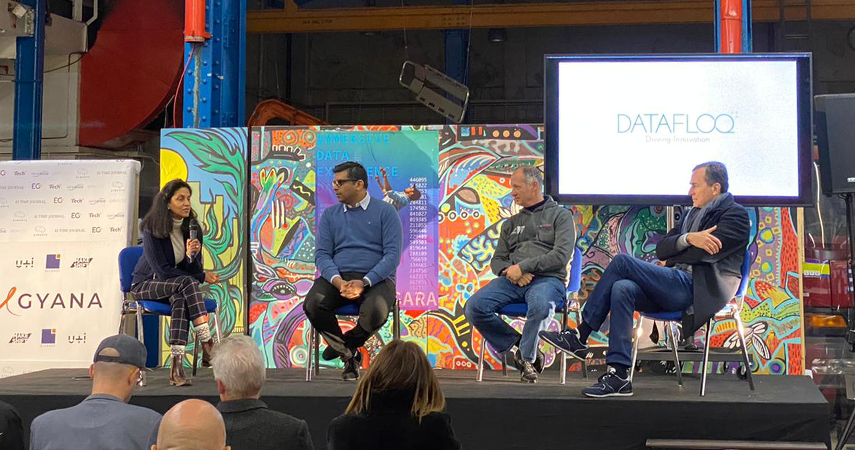Gyana SAMSARA 2019: Data scientists need not apply

Top Business Tech was in attendance at Samsara 2019, an event held to showcase and stress test Gyana’s “no code” data platform, Vayu
Einstein said: “Imagination is more important than knowledge. For knowledge is limited, whereas imagination embraces the entire world, stimulating progress, giving birth to evolution.”
At an event dubbed the region’s biggest hackathon, those wise words were ever-present as Gyana set teams of fledgeling, inexperienced data scientists to work at Samsara 2019.
Samsara represents the cyclical and circuitous nature of the world, through rebirth and life. Gyana likens this to the data scientist which resides within everybody. It’s there, it just hasn’t been born yet.
With Samsara 2019, the London based start-up aimed to bring out that inner data scientist – no coding required.

To showcase their unique product – the codeless Vayu platform which makes data science accessible to all – Gyana assembled a roster of speakers from enterprise execs to Oxford alumni and serial entrepreneurs. People from a diverse range of backgrounds and industries were all in attendance to celebrate the future of democratised, codeless data, and to share their infectious enthusiasm for the project.
Throughout the day Gyana presented talks on IoT, technology and wellness – and of course, data – in order to illuminate and inspire the attendees as they worked away in teams to win from a prize pool of £6000, with £3000 split equally between three teams, and the remaining £3000 shared between three charities of the winners’ choosing.
What is codeless data science?
The keynote speaker, global brand guru Nigel Morris, took to the stage in front of a warehouse packed full of eager participants to deliver a rousing speech about the unbridled potential of codeless data science.
“Gyana wants to see if they can crack some of the big issues, be it the environment, diversity, social inclusion or economic inclusion,” he said, with his enthusiasm for the Gyana project clearly visible and compelling.
“Our inability to adapt to integrate technology into our institutions, into the way things work, is a real problem. Throughout the history of technological change, people overestimate short term impacts and underestimate long term implications.”
See more events sponsored
by Top Business Tech
In the world, there are winners and losers in everything. Nowadays, data is a valuable commodity, and the companies using it wisely, or getting the most out of what they have, are the ones succeeding.
This data asymmetry, where one side has the data and the other side doesn’t, is creating a clear imbalance and it’s having a detrimental impact.
Gyana wants to level the playing field with Vayu by making data approachable, codeless and accessible to all.
Morris asked, “If you could take all the difficult bits of data science…if you could release the power of data science and release the power of the imagination, what could you actually achieve?”

Stress testing codeless data science
The Samsara event was designed as a stress test to put Vayu under the microscope. By putting it through its paces, and drawing on the collective endeavour of those participating in the hackathon, their goal is to point the “no-code” platform towards the more pressing issues in the world today, harnessing the imagination of hundreds of eager, codeless data scientists of varying levels of experience.
The company itself, based in central London, consists of a relatively small team, but one that combines resilience and brilliance, and above all a sense of humour. Shunning the clean-cut, hyper-marketed pomp one often associates with data demo days and Silicon Valley-style events, Gyana cut through the noise to make their message crystal clear: data science is for everyone.
What is Gyana’s Vayu platform?
Put simply, Vayu is a tool that allows anyone to be a data scientist, no matter the size of the business or level of expertise. It cleans, normalises and pipelines data, in order for you to analyse it and perform machine learning techniques. None of it requires coding experience.
Using Vayu, teams at the event had to devise a strategy and pitch their idea. The ideas brought forth by teams consisting of doctors, students and baristas, ranged from looking at how developing countries should be granted aid to how open defection and mobility impacts GDP.
While the pitches ranged in scope and scale, they had one common thread – they all utilised data to improve something or get to the bottom of a pressing issue. With Vayu, the teams demonstrated applicable, actionable solutions for real-world issues, and some of them had never even considered, let alone tried data science before.
The platform itself is astonishingly simple. In a few steps, you can go from dataset to visualisation.
First, Vayu cleans the data set. It can then be integrated into a table, to make viewing the data easier. From this, you can clean and prepare the data, filtering out information less relevant to your outcome. Then, using a suite of visualisation methods, it can display, chart, plot or pinpoint the outcome, effortlessly creating a narrative thread through your data. In turn, this narrative makes the data simpler to work with and, more importantly, it makes it easy to understand.
As Gyana says: “The world of secrets should not just belong to endless hours of analysis – it should be for everyone.”
Become a data scientist today and download Vayu for free.
